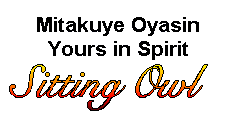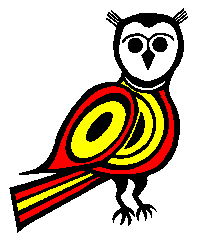|
Main
Menu
External
Pages
|
Excerpts from: 'The Power of Myth'
By: Joseph Campbell with Bill Moyers
(From: 'Earth People' Volume 4 Number 6)
I'm sure you have all heard the quote of Joseph Campbell's regarding bliss. Well, here it is, without my adaptation:
"The realisation of your bliss, your true being, comes when you have put aside the passing moment, with its terror, temptations, and its statements of requirements of life, that you should live, 'This Way'."
And here is what Joseph Campbell says about Bliss and ego, from pp.148 ‒ 149.
CAMPBELL: Myths inspire the realisation of the possibility of your perfection, the fullness of your strength, and the bringing of solar light into the world. Slaying monsters is slaying the dark things. Myths grab you somewhere down inside. As a boy, you go at it one way, as I did reading my Indian stories. Later on, myths tell you more, and more, and still more. I think that anyone who has ever dealt seriously with religious or mythic ideas will tell you that we learn them as a child on one level, but then many different levels are revealed. Myths are infinite in their revelation.
MOYERS: How do I slay that dragon in me? What's the journey each of us has to make, what you call "the soul's high adventure"?
CAMPELL: My general formula for my students is "Follow your bliss." Find where it is, and don't be afraid to follow it.
MOYERS: Is it my work or my life?
CAMPBELL: If the work that you're doing is the work that you chose to do because you are enjoying it, that's it. But if you think, "Oh, no! I couldn't do that!" that's the dragon locking you in. "No, no, I couldn't be a writer," or "No, no, I couldn't possibly do what So-and-so is doing."
MOYERS: In this sense, unlike heroes such as Prometheus or Jesus, we're not going on our journey to save the world but to save ourselves.
CAMPBELL: But in doing that, you save the world. The influence of a vital person vitalises, there's no doubt about it. The world without spirit is a wasteland. People have the notion of saving the world by shifting things around, changing the rules, and who's on top, and so forth. No, no! Any world is a valid world if it's alive. The thing to do is to bring life to it, and the only way to do that is to find in your own case where the life is and become alive yourself.
MOYERS: When I take that journey and go down there and slay those dragons, do I have to go alone?
CAMPBELL: If you have someone who can help you, that's fine, too. But, ultimately, the last deed has to be done by oneself. Psychologically, the dragon is one's own binding of oneself to one's ego. We're captured in our own dragon cage. The problem of the psychiatrist is to disintegrate that dragon, break him up, so that you may expand to a larger field of relationships. The ultimate dragon is within you, it is your ego clamping you down.
MOYERS: What's my ego?
CAMPBELL: What you think you want, what you will to believe, what you think you can afford, what you decide to love, what you regard yourself as bound to. It may be all much too small, in which case it will nail you down. And if you simply do what your neighbours tell you to do, you're certainly going to be nailed down. Your neighbours are then your dragon as it reflects from within yourself.
Our Western dragons represent greed. However, the Chinese dragon is different. It represents the vitality of the swamps and comes up beating its belly and bellowing, "Haw ha ha haww."
Democracy & Bliss. p.117 ‒ 121
CAMPBELL: It's characteristic of democracy that majority rule is understood as being effective not only in politics but also in thinking. In thinking, of course, the majority is always wrong.
MOYERS: Always wrong?
CAMPBELL: In matters of this kind, yes. The majority's function in relation to the spirit is to try to listen and open up to someone who's had an experience beyond that of food, shelter, progeny, and wealth (the bottom three chakras. Ed.).
MOYERS: What happens when you follow your bliss?
CAMPBELL: You come to bliss. In the Middle Ages, a favourite image that occurs in many, many contexts is the wheel of fortune. There's the hub of the wheel, and there is the revolving rim of the wheel. For example, if you are attached to the rim of the wheel of fortune, you will be either above going down or at the bottom coming up. But if you are at the hub, you are in the same place all the time. That is the sense of the marriage vow _ I take you in health or sickness, in wealth or poverty: going up or going down. But I take you as my centre, and you are my bliss, not the wealth that you might bring me, nor the social prestige, but you. That is following your bliss...
Now, I came to this idea of bliss because in Sanskrit, which is the great spiritual language of the world, there are three terms that represent the brink, the jumping-off place to the ocean of transcendence: Sat, Chit, Ananda. The word "Sat" means being. "Chit" means consciousness. "Ananda" means bliss or rapture. I thought, "I don't know whether my consciousness is proper consciousness or not; I don't know whether what I know of my being is my proper being or not; but I do know where my rapture is. So let me hang on to rapture, and that will bring me both my consciousness and my being." I think it worked...
If you follow your bliss, you put yourself on a kind of track that has been there all the while, waiting for you, and the life that you ought to be living is the one you are living... Wherever you are ‒ if you are following your bliss, you are enjoying that refreshment, that life within you, all the time.
Archetypes p.51 ‒ 52
MOYERS: What are archetypes?
CAMPBELL: They are elementary ideas, what could be called "ground" ideas. These ideas Jung spoke of as archetypes of the unconscious. "Archetype" is better termed because "elementary idea" suggests headwork. Archetype of the unconscious means it comes from below. The difference between the Jungian archetypes of the unconscious and Freud's complexes is that archetypes of the unconscious are manifestations of the organs of the body and their powers. Archetypes are biologically grounded, whereas the Freudian unconscious is a collection of repressed traumatic experiences from the individual's lifetime. The Freudian unconscious is a personal unconscious, it is biographical. The Jungian archetypes of the unconscious are biological. The biographical is secondary to that.
The Navaho's Pollen Path. p. 230
CAMPBELL: The Navaho have that wonderful image of what they call the pollen path. Pollen is the life source. The pollen path is the path to the centre. The Navaho say, "Oh, beauty before me, beauty behind me, beauty to the right of me, beauty to the left of me, beauty above me, beauty below me, I'm on the pollen path."
Regarding Myths Dreams and the Hero Adventure.
When Bill Moyers suggested that myths are other people's dreams, Joseph Campbell says this:
"Oh, no, they're not. They are the world's dreams. They are archetypal dreams and deal with great human problems."
And later (P. 39.) he says:
CAMPBELL: "Heaven and Hell are within us, and all the gods are within us. This is the great realisation of the Upanishads of India in the ninth century B.C. All the gods, all the heavens, all the worlds, are within us. They are magnified dreams, and dreams are manifestations, in image form, of the energies of the body in conflict with each other. That is what myth is. Myth is a manifestation in symbolic images, in metaphoric images, of the energies of the organs of the body in conflict with each other. This organ wants this, that organ wants that. The brain is one of the organs."
"So when we dream, we are fishing in some vast ocean of mythology that goes down and down and down. You can get all mixed up with complexes, [guides, messengers, dream bodies, details etc. Ed.] you know, things like that, but in really, as the Polynesian saying goes, you are then "standing on a whale fishing for minnows." We are standing on a whale. The ground of being is the ground of our being, and when we simply turn outward, we see all of these little problems here and there. But, if we look inward, we see that we are the source of them all..."
(P. 39.)
"Myths and dreams come from the same place. They come from realisations of some kind that have then to find expression in symbolic form...
"They come from the imagination, don't they? The imagination is grounded in the energy of the organs of the body, and these are the same in all human beings."
(P. 42.)
Regarding the aspect that myths are the societies dreams Joseph Campbell says that if your private dreams are in accord with the societies myths you are more likely to live healthily in that society, but if your private dreams are out of step with the public, your in trouble. This is because if you're forced to live in that system, you'll be a neurotic. But, this is where I fit in with my dream or wish to help, where ever I can, to heal the individuals trying to live in the current social system, which is NOT harmonious with life. So you may call me a neurotic if you wish, but as Joseph Campbell explains, most visionaries, leaders and heroes are close to the edge of neuroticism and that:
"They've moved out of the society that would have protected them, and into the dark forest, into the world of fire, of original experience. Original experience has not been interpreted for you, and so you've got to work out your life for yourself. Either you can take it or you can't. You don't have to go far off the interpreted path to find yourself in very difficult situations. The courage to face the trials and to bring a whole new body of possibilities into the field of interpreted experience for other people to experience ‒ that is the hero's deed." (P. 41.)
My only problem is getting people to listen to, or understand my message, which is actually a universal or archetypal message found deep in all true mythologies and messages of sage's and visionaries. But Joseph Campbell explains this too; in that the hero often comes out of the forest with gold and it turns to dust, or ashes. But as far as I'm concerned I still have gold even if everyone else thinks I have dust.
 
|